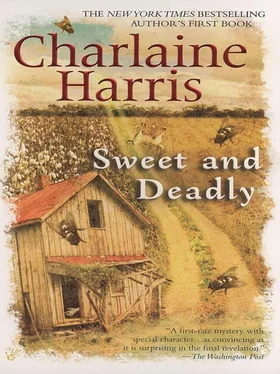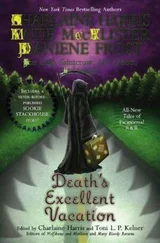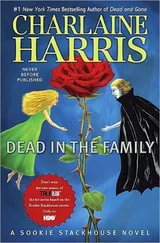Her face was turned away from Catherine. Even in the dimness, Catherine could make out dark patches matting the gray hair. She realized then what made the head so oddly shaped.
A fly landed on the woman’s arm.
Catherine began shaking. She was afraid her knees would give way, that she would fall on top of the stinking thing. Her stomach began to twist.
She backed away, tiny shuffling steps that took all her concentration. Her arm touched a wooden support. She had reached the edge of the porch.
She turned to grip the support, then lowered a foot until it rested firmly on the ground.
She reached the stump and sat on its uneven surface, with her back to the tenant house. She stared across her land.
“Oh my God,” she whispered.
And the fear hit her. After a stunned second she scrabbled in the dust for her gun.
Her eyes darted around her, searching.
Nothing moved on the road, or in the fields; but she felt terrifyingly exposed in that vast flatness.
The car. She had to make it to the car. It was only a few yards away, parked under the oak’s inadequate shade. All she had to do was cross those yards. But she was frozen in position like an animal caught in headlights.
The sheriff, she thought with sudden clarity. I’ve got to get Sheriff Galton.
With that thought, that plain plan, she was able to launch herself from the stump.
She opened the door and shoved the pistol to the other side of the car with shaking fingers, then slid into the driver’s seat. Shut the door. Locked it. She managed to turn the key in the ignition before her muscles refused to obey her. Her fingers on the gearshift were too palsied to put the car into drive.
She screamed at her helplessness. She covered her ears against the ragged sound.
But with that release, her shaking lessened. She could put the car in gear and start back home to Lowfield.
THERE WERE TWO houses where the dirt road joined the highway. Catherine could have stopped at either and found help.
She never thought of it. In a fog of shock she had fixed her destination, and she would not stop until she reached it. She drove south on the highway without seeing anything but the concrete in front of her.
To reach the sheriff ’s office, she had to turn off the highway into the town. When she saw the familiar brick building sitting squarely in front of the old jail, Catherine felt dizzy with relief.
The lights inside the little building were on. Through the glass door Catherine could see the dispatcher, Mary Jane Cory, seated at her desk behind the counter.
It took an immense effort of will to unclamp her hands from the wheel, open the car door, swing her legs out, and force the rest of her body to follow them.
“Good morning, Catherine! I’ll be with you in a minute,” Mrs. Cory said briskly, and thudded out a few more words on her ancient typewriter.
In what later seemed to Catherine insanity, she kept silent and waited obediently. She leaned on the counter, her hands gripping the far edge of it to keep upright.
That silence alerted some warning signal in Mary Jane Cory. She gave Catherine a second glance and then was on her feet, her hands covering Catherine’s.
“What’s the matter?” the older woman asked sharply.
“The sheriff…I want to see the sheriff,” Catherine said painfully. Her jaws ached from long clenching.
“Are you going to faint, Catherine?” Mrs. Cory asked, still in that sharp watchful voice.
Catherine didn’t answer.
Mrs. Cory switched her grip from Catherine’s hands to her upper arms and called without turning her head, “James Galton! Come here quick!”
There was a stir in the office that had “Sheriff” on the door. The roar of the air conditioning covered the sound of Galton’s quiet steps, but a khaki-covered elbow appeared in Catherine’s range of view, propped on the counter beside her.
“You got troubles, Catherine?” rumbled a carefully relaxed voice. Catherine saw Mrs. Cory’s platinum head give a shake in answer to some silent query of Galton’s.
Now that the time had come to deliver her message, Catherine found herself curiously embarrassed, as if she were about to commit a deliberate faux pas.
She turned her head stiffly to look up at Galton.
“There’s a dead woman in an old tenant house. On the place.”
“You sure she’s dead?”
Catherine’s face was blank as she stared at him. “Oh, yes,” she said.
“A black woman?”
“No,” she said, and felt the ripple of surprise. Lowfield white women did not get themselves dumped in tenant shacks.
“Do you know who it is?”
“No. No.” Her voice sounded odd to her own ears. “She’s covered in blood.”
Galton’s face changed as she stared at him. He didn’t look like the relaxed and genial Jimmy Galton who had been her father’s friend.
He looked like the sheriff.
Catherine had assumed she could go home after informing the sheriff of her discovery.
She had, she soon realized, been thinking like a child.
Galton issued a few commands to Mrs. Cory, who got busy on the radio and telephone. He gently but quite firmly led Catherine into his office, guided her to the chair in front of his desk, and then eased himself into his own battered chair.
“You want to go to the doctor for a tranquilizer?”
But the doctor was her father. He was dead.
No, she thought, horrified. No. She shook her head to clear her thoughts. This kind of confusion hadn’t happened to her in a long time; she had thought it was over with.
“Want something to drink?”
“No,” she whispered.
He indicated his pack of cigarettes.
Catherine forced herself to reach for one and light it, while Galton eyed her intently.
He’s trying to see if I can do it by myself, Catherine thought suddenly. Her back stiffened.
“Now, I’m going to ask you a few questions. You just take your time answering,” he said.
Catherine nodded briefly.
He was being kind in a stern way, but Catherine realized that the day would be longer than she had ever imagined when she arose early that morning to go target shooting.
Galton jogged her with a couple of questions. Once she got going, she gave a clear account of her morning.
There was nothing much to tell.
When she finished, Galton rose without a word, patting her absently as he passed into the outer room.
Catherine heard a shuffling of feet in the main office, a murmur of voices. Mrs. Cory had called in the deputies.
Catherine looked down at her hands clenched in her lap. Her heavy dark hair swung forward, shielding her face, giving her a tiny corner of privacy against the open door.
The look of her twined fingers, the smell of the sheriff ’s office, and the scrape of official boots had ripped the cover from a well of memory. For a few moments she was not in Lowfield but in a similar police station in a similar tiny town, in Arkansas. She was not wearing blue jeans but the dress she had worn to work that day. Her parents had been dead for four hours instead of six months.
With a terrible effort, she wrenched herself back into her proper place.
I will not give way, she told herself ferociously. I will get through this and I will not give way.
She listened to Sheriff Galton’s voice rumbling in the main office. He was telling Mary Jane Cory to call enough men for a coroner’s jury.
She rode back to the shack in the sheriff ’s car. The car was bright green with gold lettering and a star on the side. She could see people glancing in as the sheriff drove past, then looking again as they identified Galton’s passenger as Catherine Linton.
Though she had cut herself off from the mainstream of life in Lowfield, Catherine was fully aware that the talk would already be beginning. A month ago, it would not have occurred to her to care.
Читать дальше












